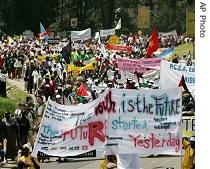2007年VOA标准英语-African Farmers Worry About Self Reliance(在线收听)
Dakar
21 January 2007
At this week's World Social Forum in Nairobi, Kenya fair-trade campaigners are putting a priority on restarting the so-called Doha round of trade talks. Those negotiations focus on agricultural subsidies in Europe and the United States, which activists say hurt small farmers in developing countries. Jordan Davis reports from Dakar that farmers in one nearby region say self-reliance may no longer be enough to save them economically.

People march during the opening of the World Social Forum in Nairobi, 20 Jan 2007
For farmers in the Niayes region, just east of the sprawling Dakar suburbs, tending to crops means endless trips to the well.
Farmers fill two buckets at a time. Then they attach a bucket to each end of a long wooden stick they balance on their shoulders to carry back to the fields.
The leader of this farming community, Mamadou Diop, says a water pump would be too expensive, at least the equivalent of $500, maybe a $1,000.
Tractors are also out of the question. Diop says farmers in Niayes might make around a $150 in a good month.
It is not much money, but many of these farmers might not be tilling the soil at all if they had not organized over a decade ago.
To save their wind-swept fields of okra and cabbage a decade ago, Mamadou Diop says farmers formed a credit union.
Diop says it used to be that farmers would not have enough money because the very people that lent them the money to plant their crops would then force them to sell their harvest at low prices.
That changed when farmers began lending to one another through the credit union. That allowed them to sell crops to the highest bidder, not to their financiers.
Matar Ndoye, who runs the credit union for the farmers' federation,says these days, most of the farmers in the area own their own land, thanks to the help of a micro-finance loan. And once a loan is paid off, a family will have more money in their pocket at the end of each month.
But Mamadou Diop, the head of the farmers federation, says not all of their problems have been solved.
Growers in Niayes now have to compete against imported crops, he says.
Market sellers in Dakar these days often have a choice between vegetables from Niayes, or competitively priced products from the European Union, where farmers are heavily subsidized.
Senegal's government has placed a priority on agriculture to help develop its economy.
But Mamadou Diop says he worries how long the small family farmers in the Niayes can hold out against cheap, imported agricultural products.